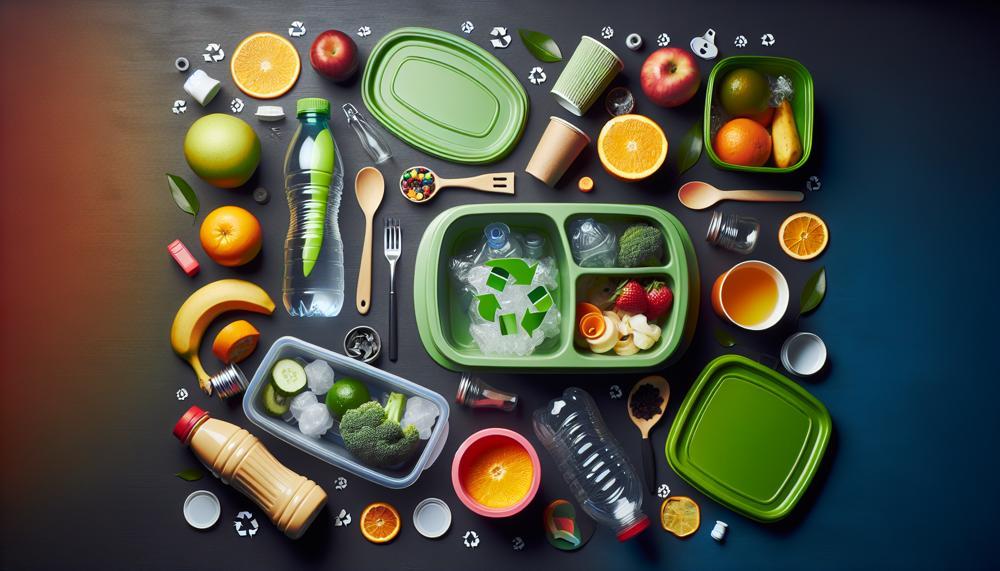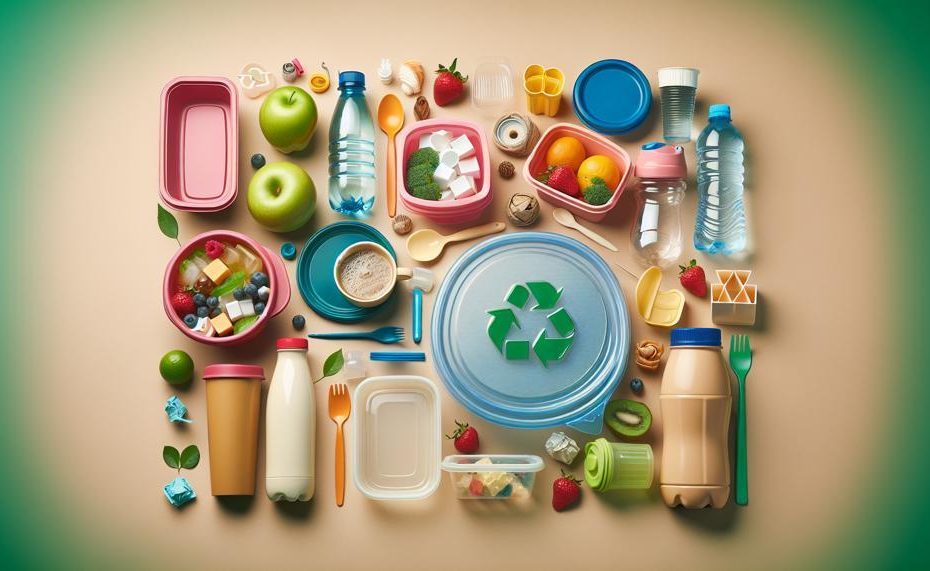Have you ever stopped to think about the number of plastic tupperware containers you throw away in a year? It’s probably more than you realize. Many people are starting to become more conscious of their waste and its impact on the environment. And one simple way to make a difference is by recycling your old tupperware containers.
In this blog post, we’ll dive into the world of tupperware recycling and explore its benefits, as well as how you can do it effectively.
So, can you recycle tupperware?
Yes, most recycling programs accept plastic food storage containers and lids, including Tupperware, if they are empty, clean, dry, and have the recycling symbol on the bottom. The recycling symbol is a triangle made of three chasing arrows, which is the universal plastic resin symbol. Most recycling programs also accept #5 plastics, which is food-safe and heat-resistant plastic.

Contents
- 1 Understanding Tupperware and Recycling
- 2 The Different Types of Plastic Used in Tupperware
- 3 PP Recycling: Challenges and Limitations
- 4 Guidelines for Preparing Tupperware Containers for Recycling
- 5 Alternative Options for Disposing of Tupperware Containers
- 6 Repurposing Tupperware Containers for Household Use
- 7 Conclusion
Understanding Tupperware and Recycling
Tupperware containers, made from polypropylene plastic, are a convenient way to store food and other items. However, their disposal can have a significant impact on the environment. As such, it is important to know how to properly recycle or dispose of them.
One option is to recycle them. However, this can be challenging due to the limited acceptance of PP by recycling facilities and strict guidelines. To combat this issue, Tupperware Brands has taken a proactive approach by introducing new polymers made from recycled materials in their products. This not only reduces the amount of plastic waste but also promotes sustainability.
If recycling is not available or feasible, there are other ways to dispose of Tupperware containers without harming the environment. One option is repurposing them for other storage needs or donating them to someone in need. This not only extends the life of the container but also reduces waste and benefits others.
The Different Types of Plastic Used in Tupperware
When it comes to Tupperware containers, there are two types of plastic that are commonly used – PP (#5) plastic for the container itself and LDPE (#4) plastic for the lid. This use of different types of plastic can have an impact on its recyclability, as not all recycling facilities accept PP plastic.
Furthermore, any food residue or damage to the container can also hinder its recyclability.
| Plastic Type | Common Use | Recyclability |
| PP (#5) plastic | Food containers and packaging | Not widely accepted by recycling facilities |
| LDPE (#4) plastic | Tupperware lids | Can be recycled separately |
Even though both types of plastic are technically recyclable, the limited acceptance and strict guidelines make it challenging for Tupperware containers to actually be recycled.
This is why it is important to explore alternative options such as repurposing or donating these containers to prevent them from ending up in landfills.
If recycling is the only option, it is crucial to follow the guidelines of your local recycling facility and ensure the containers are clean and undamaged.
PP Recycling: Challenges and Limitations
Recycling tupperware made of PP plastic poses several challenges and limitations, but there are ways to overcome them.
These include understanding low recycling rates, varying guidelines depending on location, and the need for preparation before recycling.
- Low Recycling Rates: PP plastic is recyclable, but its recycling rate is relatively low compared to other plastics like PET (#1) or HDPE (#2). This is due to its uncommon usage and the lack of acceptance in all recycling facilities. As a result, a significant number of PP containers end up in landfills instead of being recycled.
- Varying Guidelines: Another challenge in recycling tupperware made of PP plastic is the inconsistency in guidelines across different locations. For instance, while some cities may accept PP plastic in their curbside recycling program, others may not. Hence, it is essential for individuals to check with their local recycling facility or use online locators to find the nearest recycling center that accepts PP plastic.
- Preparation Before Recycling: To recycle tupperware containers made of PP plastic, preparation is necessary. This includes washing the container and removing any food residue, as well as separating the lid if it is made of LDPE plastic. Failure to do so may result in these containers being rejected by recycling facilities.
- Alternative Options: Apart from recycling, there are alternative ways to dispose of tupperware made of PP plastic. These containers can be donated to those in need or repurposed for different uses, such as storage or planters. This helps prevent them from ending up in landfills and reduces the demand for new plastic production.
Guidelines for Preparing Tupperware Containers for Recycling
- Check the Resin Identification Code: The first step in properly preparing Tupperware containers for recycling is to check the Resin Identification Code (RIC) on the bottom of the container. This code will help you determine the type of plastic used and whether it can be recycled.
- Clean the Container: Before recycling, it is essential to thoroughly clean the container. Remove any labels or stickers and wash off any food residue. This will prevent contamination and ensure that the container is ready for recycling.
- Follow Local Recycling Guidelines: Recycling guidelines may differ depending on your local area. It is important to follow these guidelines to ensure that your Tupperware container is properly recycled.
- Empty, Clean, and Dry: Ensure that the container is completely empty, clean, and dry before recycling. Any leftover food or liquid can contaminate other materials in the recycling process. Drying the container will also prevent mold growth.
- Recycle with Lid Attached: When recycling Tupperware containers, make sure to keep the lid attached. This prevents the lid from ending up in a landfill and ensures that it is also recycled.
- Take it to a Recycling Center: Do not put Tupperware containers in your regular recycling bin. Instead, take them to your local recycling center after thoroughly cleaning and drying them. Most Tupperware products are 100% recyclable, so make sure they are being properly recycled.
Alternatives to Recycling:
If you are unable to recycle your Tupperware containers, there are other options for disposing of them sustainably. These include donating them to someone who can still use them, selling them secondhand, or repurposing them for other household items.
Alternative Options for Disposing of Tupperware Containers
There are numerous options available when it comes to disposing of used or damaged Tupperware containers in an eco-friendly way.
These include giving them a new purpose, recycling them, taking advantage of Tupperware’s recycling program, and donating them to nearby schools or thrift stores.
By choosing any of these alternatives, not only do you minimize waste, but you also play a role in promoting sustainability and conscious consumption.
One of the best ways to dispose of old or broken Tupperware containers is to repurpose them for other uses. For example, you can use them as storage containers for household items, such as spices or office supplies. Additionally, they can be used as planters for small herbs or succulents, or even as a makeshift paint palette for art projects.
Another option is to recycle the containers. While not all recycling centers accept Tupperware products due to their plastic composition, some facilities do. It’s important to research and find a center that does accept these items in order to properly recycle them.
Tupperware also offers its own recycling program, where customers can send in their used containers for proper recycling. This not only ensures that the containers are disposed of correctly but also allows the materials to be repurposed for new products.
Lastly, donating old Tupperware containers to schools or thrift stores is a great way to give them a second life. Schools often use them for various classroom activities, while thrift stores can sell them at a discounted price for individuals looking for affordable kitchen essentials.
Repurposing Tupperware Containers for Household Use
Tupperware containers are not just for storing leftovers and packing lunches. These versatile products can be repurposed in creative ways, reducing waste and promoting sustainability. Here are some inspiring ideas to make the most out of your Tupperware containers:
Plant Pots and Herb Planters
Transform your Tupperware containers into plant pots or herb planters. Simply drill holes at the bottom for drainage and fill them with soil and your desired plants.
You can even add a personal touch by painting or decorating the containers for a unique garden.
Organizer Boxes
Say goodbye to cluttered spaces with Tupperware containers as organizer boxes.
These containers are perfect for storing small items such as jewelry, toys, stationeries, and craft materials. Keep your space neat and organized with this simple repurposing idea.
Compost Buckets
Instead of buying a compost bin, why not use old Tupperware containers to collect food scraps for composting?
This not only reduces food waste but also creates nutrient-rich soil for your garden.
Donate to Charity or Schools
If your Tupperware containers are still in good condition, consider donating them to a local charity or school.
These organizations may need storage containers, and by donating, you are not only helping others but also promoting sustainability.
Arts and Crafts
Get creative with Tupperware containers and use them for various arts and crafts projects.
They make great paint trays, homemade bird feeders, or fun DIY projects to do with your kids.
Recycle for Free
When your Tupperware containers are no longer usable, don’t just toss them in the trash.
Rubbermaid’s Food Storage Recycling Program in partnership with TerraCycle offers free recycling services for these containers.
By repurposing or recycling old Tupperware containers, you are not only reducing waste but also finding new and creative ways to use these products. So next time you plan to throw one away, consider how you can repurpose it instead.
Also Read: Can You Recycle Ice Cream Cartons?
Conclusion
In conclusion, it is crucial that we reconsider our approach to disposing of plastic tupperware containers. The sheer volume of waste they contribute to landfills and oceans is a pressing issue that demands our attention.
Fortunately, as we have explored in this blog post, there are simple and effective ways to make a positive impact by recycling or repurposing these containers.
By taking action, we not only reduce waste and conserve resources but also promote a more sustainable future for our planet.
So the next time you pack your lunch or store leftovers in a trusty tupperware container, remember the power you hold in making a difference through responsible disposal methods. Let’s join together and take action towards creating a greener and healthier world for ourselves and future generations.
It may seem like a small step, but every effort counts towards building a better tomorrow.




